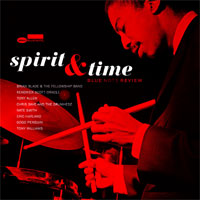Blue Note Review • Volume Two: Spirit & Time
 eissuing Blue Note recordings has been good business. Various
labels have done it -- all the way back to the 1960s, when Liberty Records reissued LPs
after that label bought Blue Note. Between then and now, there have been multiple
wide-ranging LP reissue series from the likes of King Records, Analogue Productions and
Music Matters, all of which have released hundreds of titles. eissuing Blue Note recordings has been good business. Various
labels have done it -- all the way back to the 1960s, when Liberty Records reissued LPs
after that label bought Blue Note. Between then and now, there have been multiple
wide-ranging LP reissue series from the likes of King Records, Analogue Productions and
Music Matters, all of which have released hundreds of titles.
Blue Note Review is a different kind of reissue project. First, it's a subscription service that Blue Note itself runs, instead of licensing music to other labels for re-release. Perhaps the biggest difference is that instead of selling only LPs, Blue Note Review offers a package that has LPs as the main, but not sole, product. It launched in late 2017 with Volume One: Peace, Love & Fishing, which quickly sold out. A total of 1500 were available, and you had to be a subscriber to get one. There are 2000 of this latest package available. You still have to be a subscriber to own one, but that's where the similarities end. Not only is the music on Volume 2: Spirit & Time more plentiful than that of Volume One, the production of the LPs has improved. Kevin Gray of Cohearent Audio cut the lacquers from the analog master tapes, and RTI pressed the LPs on 180-gram vinyl -- a combination that has been responsible for hundreds high-quality Blue Note reissues. Best of all, Joe Harley, co-founder of Music Matters and Blue Note's in-house "Tone Poet," supervises production of the LPs. He's just the guy for the job, possessing deep understanding of how to produce quality records and a discerning ear for choosing worthy titles. There are three separate recordings here spread across four LPs -- one a two-record compilation of contemporary music, and two from Blue Note's back catalogue. The compilation collects new and unreleased numbers that pay tribute to the late drummer Tony Williams, who began recording for Blue Note in the early 1960s, when he was still a teenager. These reinterpret compositions from Williams' late-career Blue Note albums and feature modern-day drummers, among them Brian Blade, Kendrick Scott, and Eric Harland. Also included is a previously unreleased live recording of Williams' quintet. The music here has the signature of so many Blue Note recordings. Nothing is perfunctory; the goal is to make music that sounds vital when it's made and will continue do so in the future. The two reissues, Art Blakey and the Jazz Messengers' Africaine and Bobby Hutcherson's Patterns, share an interesting history. There were many Blue Note sessions from the 1950s and 1960s that were not released immediately after they were recorded. For some reason, Blue Note founders Alfred Lion and Francis Wolff felt the sessions didn't meet their musical standards. (Lion and Wolff were unique among producers of jazz for requiring musicians to practice together before recording.) Africaine was recorded in 1959 and released in 1979; Patterns was recorded in 1968 but not released until 1980. When you hear them, you will wonder what Lion and Wolff were thinking. The hard bop of Africaine features some choice Blakey drum work. Patterns is more serene and cerebral, in keeping with vibraphonist Hutcherson's best work for Blue Note. Both recordings include the backing of Blue Note royalty: Lee Morgan and Wayne Shorter have steaming solos throughout Africaine, while Reggie Workman and Joe Chambers provide the rhythmic backbone on Patterns. There's more -- Blue Note swag. Volume Two includes two booklets, both nicely made and informative, and two high-quality black-and-white photographs of first-team Blue Note drummers Art Blakey and Elvin Jones. More unusual is a set of trading cards in the style of old Topps baseball cards, each depicting a different Blue Note notable. The compilation LPs are duplicated on an included CD, and, for care of your LPs, there's a Blue Note-branded anti-static carbon-fiber bush for removing dust before each play. The records and goodies all fit into a handsome, heavyweight box with hinged lid. The spine will be an eye-catcher on your record shelves. The cost of Volume Two is $200, a substantial
sum. But what you get for your 200 bucks is also substantial, and it's all unavailable any
other way. There are many labels producing special boxed sets of LPs. Among them, Blue
Note Review stands out for its access to an important label's entire catalogue and
inherent respect of the label's primary place in jazz history. And if what you get from Volume
Two isn't enough, Blue Note has just launched the Tone Poet reissue series, which Joe
Harley curates. |
